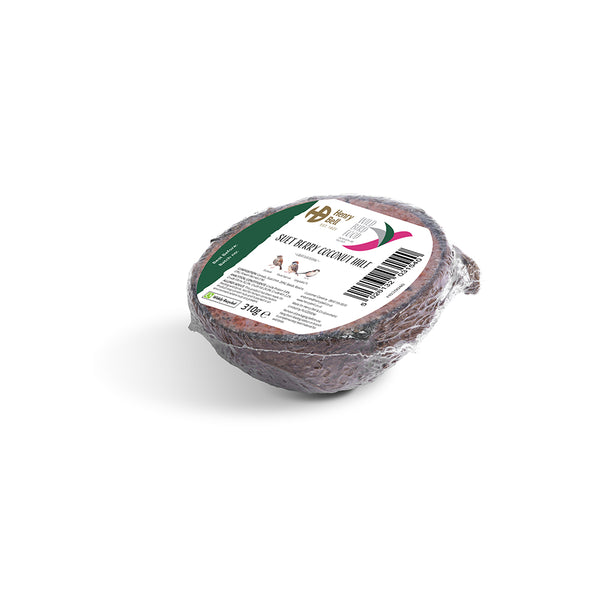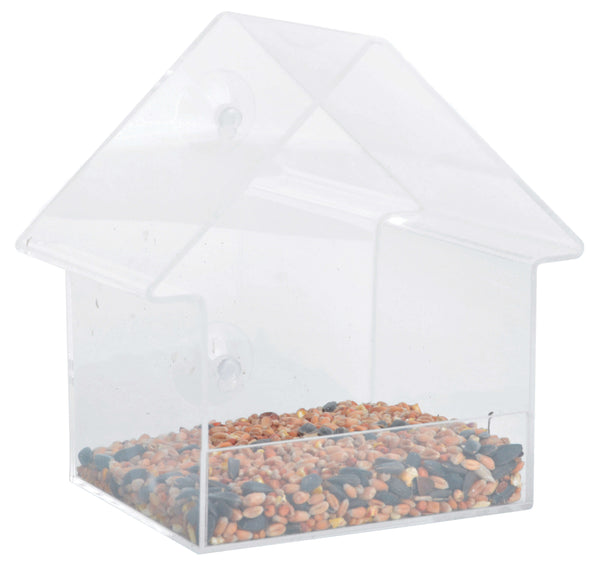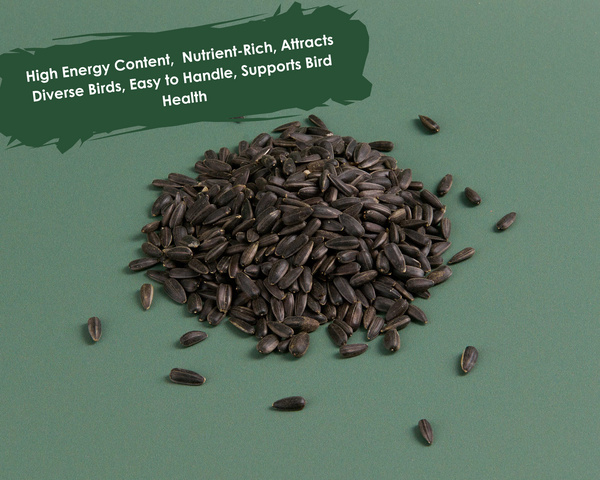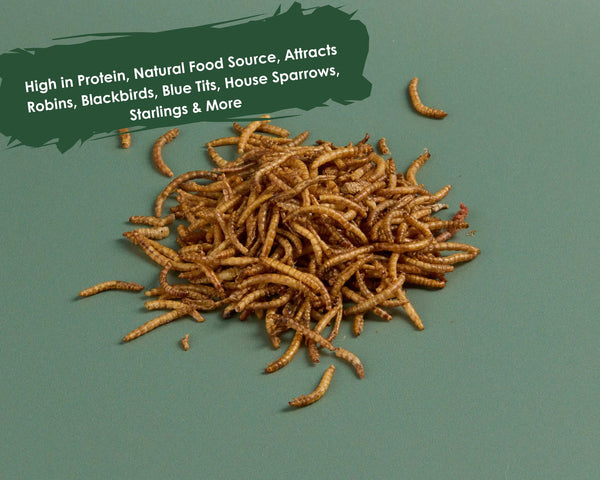Knowing When to Stop Feeding Birds: A Seasonal Guide
Feeding garden birds can be a rewarding experience and a hobby for many, providing these enchanting wildlife with essential nourishment while giving us a chance to observe their beautiful presence up close.
However, as responsible caretakers of the avian world, it is essential to know when to start and stop this practice throughout the year. Understanding the nuances of each season can help ensure the health and well-being of our feathered friends. In this article, we'll explore when to stop feeding birds in each season and the reasons behind it.

Spring
In the UK, spring is a crucial season for wild birds as they recover from the challenges of winter and prepare for the breeding season ahead. During this time, the natural environment becomes a haven of food resources, offering a diverse array of insects, worms, caterpillars, and budding plant matter.
As temperatures rise and daylight hours increase, the bird population becomes more self-sufficient, taking advantage of the abundance of food available in the wild. But assisting by offering bird foods in a feeder will attract many birds to your outdoor space.
Abundance of Natural Food Sources:
Spring is a time of renewed growth, and this is especially evident in the insect world. Insects and invertebrates, such as beetles, spiders, caterpillars, and worms, thrive in the warmer temperatures, making them abundant and easily accessible for wild birds. These protein-rich food sources are essential for parent birds as they seek to provide adequate nutrition for their hatchlings.
The emergence of blossoms and buds on trees and shrubs also attracts a host of caterpillars and other invertebrates, which become a vital food source for insectivorous birds like robins, blackbirds, and thrushes. These birds are highly skilled at foraging for insects among the foliage and on the ground, honing their feeding techniques to perfection during the spring months.
Natural Foraging Behaviour:
Feeding birds during spring should be approached with caution to avoid interfering with their natural foraging behaviours. When wild birds have easy access to human-provided food through feeders, they may become dependent on these sources and neglect their natural foraging instincts. Over time, this can hinder their ability to find food independently, potentially leading to problems when feeders are no longer available.
Supporting Nesting Birds:
During spring, many bird species engage in nesting activities, requiring a steady and diverse supply of insects and caterpillars to nourish their growing chicks. By allowing birds to rely on natural food sources during this period, we promote their self-sufficiency and ensure that they are equipped to care for their young effectively.

When to stop feeding birds in spring:
As the days grow longer and the natural food supply reaches its peak, it's best to begin tapering off bird feeding in late spring, around April or May. At this point, resident birds such as robins, blackbirds, and thrushes have adapted to the abundance of insects and have become more proficient at finding food in their environment. By discontinuing bird feeding during this time, we encourage them to forage naturally and maintain their self-reliance.
However, it's important to note that stopping bird feeding entirely can be abrupt and may affect some birds that have grown accustomed to feeder visits. A gradual reduction in the frequency and quantity of food offered over a few weeks can help ease the transition and give birds ample time to adapt to the changing conditions. Many birds will visit feeders if they know they are guaranteed food, it will also help to attract birds to your garden all year round.

Summer
Summer is a season of both abundance and challenges for birds in the UK. While many natural food sources, such as insects and berries, are plentiful, periods of hot weather and drought can impact the availability of these resources. As a result, supplementary feeding during the summer months can be beneficial in helping birds meet their nutritional needs and stay hydrated.
Natural Food Sources and Challenges:
During the summer, the UK's countryside and gardens come alive with a rich variety of insects, including butterflies, moths, grasshoppers, and beetles. These insects serve as a critical food source for insectivorous birds, such as blue tits, great tits, and wrens. Additionally, the ripening of fruits and berries, such as elderberries and blackberries, offers an energy-rich diet for birds like blackbirds, thrushes, and song thrushes.
However, the summer season also brings challenges, especially during dry spells and heatwaves. Prolonged periods of hot weather can cause a reduction in insect populations, as some species may struggle to survive in these conditions. Similarly, water sources may dry up, making it challenging for birds to find a reliable supply of fresh water for drinking and bathing.
Benefits of Supplementary Feeding:
Supplementary feeding during the summer can provide a lifeline for birds, particularly during periods of food scarcity and water shortage. High-energy seeds, such as sunflower hearts, are excellent options for attracting a diverse range of bird species, including finches, sparrows, and nuthatches.
Nectar feeders can be set up specifically to attract hummingbirds if they are present in the region. Hummingbirds are a rare sight in the UK, but in some areas, they may be spotted during summer migrations, and offering a nectar solution can provide them with the necessary energy for their journey.
Responsible Feeding Practices:
When feeding birds in the summer, it's essential to practice responsible feeding to avoid potential issues. Here are some tips to consider:
- Provide Minimal Offerings: To encourage birds to continue foraging for natural food, reduce the amount of supplementary food offered gradually as natural food sources become more abundant.
- Choose High-Energy Foods: Opt for high-quality seeds and suet to provide birds with the essential nutrients they need during the summer months. Why not add a bird table as a great feeding platform to your garden for adult birds and young birds?
- Keep Feeders Clean: Regularly clean bird feeders and bird baths to prevent the growth of harmful bacteria and maintain a hygienic feeding environment.
- Supply Fresh Water: Place shallow dishes or bird baths with fresh water to ensure birds have a reliable source of hydration during hot weather.

When to stop feeding birds in summer:
Unlike other seasons, there is no strict cut-off date for summer bird feeding. The practice can be continued throughout the summer with minimal offerings of high-energy seeds and nectar.
However, as autumn approaches and natural food sources become more abundant, you can gradually reduce the amount of supplementary food provided to allow birds to transition back to foraging for natural resources. It is wise to feed birds less frequently as Autumn approaches.
Autumn:
Autumn, or fall, is a period of significant transition for bird populations in the UK. During this season, various bird species undergo migratory movements, while resident birds prepare for the approaching winter. Understanding the dynamics of autumn bird behaviour is crucial for providing appropriate supplementary feeding to support their needs during this critical time.
Migratory Movements:
Autumn marks the beginning of the migratory season, as many bird species undertake long journeys to warmer regions in search of better food and breeding conditions. Swallows and house martins are well-known examples of birds that migrate from the UK to Africa during autumn. These aerial acrobats leave their summer nesting grounds to take advantage of the insect-rich environment in their wintering areas.
During their migratory flights, these birds require substantial energy reserves to sustain them throughout the journey. Supplementary feeding in the form of high-energy foods and live food, such as mealworms, can provide a valuable boost to their energy levels before their departure.
Resident Birds' Preparations:
While some birds leave during autumn, others remain in the UK throughout the winter. These resident birds, including robins, blue tits, and great tits, begin to prepare for the colder months by engaging in food hoarding behaviours. They collect and cache food in various hiding spots to ensure a steady supply during times of scarcity. The abundance of natural food sources in autumn, such as berries and seeds, enables them to build up their reserves.
Supporting Non-Migratory Birds:
Supplementary feeding during autumn is particularly beneficial for non-migratory birds, as it helps them accumulate the necessary energy and nutrients for winter survival. Peanuts, fat balls, and mealworms are excellent choices for these birds, providing the essential fats and proteins they need to endure the colder months.
Responsible Feeding Practices:
While autumn bird feeding is essential for many species, it's crucial to adopt responsible feeding practices. Here are some guidelines to follow:
- Provide Varied Food: Offer a diverse selection of food types to cater to the dietary needs of different bird species. This includes seeds, nuts, suet, and live or dried mealworms.
- Maintain Hygiene: Regularly clean bird feeders and bird baths to prevent the spread of diseases among birds.
- Water Availability: Ensure a clean and fresh water source is available for drinking and bathing, as water becomes scarcer in colder weather. A bird bath is a great garden addition.

When to stop feeding birds in autumn:
The ideal time to stop feeding birds in autumn depends on the regional climate and the presence of migratory birds. As migratory birds leave the UK by late September or early October, it's advisable to continue feeding until late October or early November to support the resident birds' preparations for winter.
However, it's important to pay attention to the local bird populations and adjust the feeding schedule accordingly. If you notice that migratory birds have left, and resident birds have ample access to natural food, you can gradually reduce supplementary feeding.
Winter:
Winter is perhaps the most critical season for bird feeding in the UK, as it presents significant challenges for avian populations. During this time, food sources become scarce, and harsh weather conditions can make it difficult for birds to find enough nourishment to survive. Supplementary feeding can make a substantial difference in the survival and well-being of various bird species during the winter months.
Food Scarcity and Challenges:
Winter brings a dramatic reduction in the availability of natural food sources for birds. Insects are scarce, and many plants go dormant, resulting in a limited supply of seeds and berries. Additionally, the ground may be covered with snow, making it challenging for ground-feeding birds to forage for food.
Cold temperatures increase birds' energy demands, as they must burn more calories to stay warm. Without sufficient food, birds may suffer from malnutrition and decreased energy levels, making them vulnerable to predation and harsh weather conditions.
High-Energy Foods for Winter:
During winter, providing high-energy foods is essential to help birds cope with the harsh conditions. These foods are rich in fats and proteins, offering a concentrated source of energy for birds to sustain themselves throughout the colder months. Popular high-energy foods for winter feeding include:
- Suet: Suet is a solidified fat product that can be offered in various forms, such as suet blocks, suet balls or fat balls in a fat ball feeder. It is a favorite among many bird species, including woodpeckers, nuthatches, and blue tits.
- Nyjer Seeds: Nyjer seeds are tiny black seeds that are a favorite of finches, especially goldfinches and siskins. They are highly nutritious and offer a much-needed energy boost for birds during winter.
- Sunflower Seeds: Black oil sunflower seeds are a fantastic all-around option for attracting a wide variety of bird species, including cardinals, chickadees, and sparrows. Black sunflower seed is a great winter bird seed and can be provided to birds in a bird feeder.
Winter Bird Species and Their Needs:
Various bird species rely on supplementary feeding during winter to survive. Some of the common species that benefit from winter feeding include:
- Robin: Robins are frequent visitors to bird feeders during winter, and they enjoy suet, mealworms, and crushed peanuts.
- Great Tit and Blue Tit: These small birds benefit from peanuts and suet feeders, which provide them with the necessary fats and proteins to maintain their energy levels.
- Chaffinch: Chaffinches are attracted to sunflower seeds and will visit ground feeders or low platforms to access the food.
Responsible Winter Feeding:
While winter bird feeding is crucial for the survival of many species, it is essential to practice responsible feeding:
- Cleanliness: Regularly clean bird feeders to prevent the spread of diseases among the birds.
- Fresh Water: Ensure a consistent supply of fresh water for birds to drink and bathe, as natural water sources may freeze during winter.
- Suitable Feeder Placement: Position feeders away from areas where predators can easily ambush the birds.
When to stop feeding birds in winter:
Winter bird feeding is essential and should continue throughout the season until early spring. As temperatures start to rise and natural food sources become more available, birds will gradually rely less on feeders.
However, it's advisable to continue providing supplementary food until the birds have a reliable and abundant supply of natural food.











